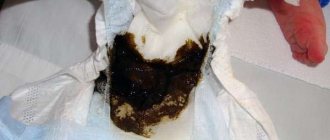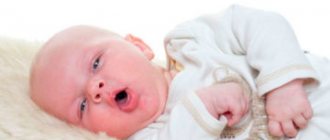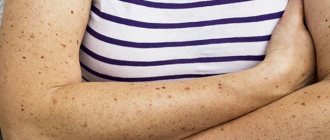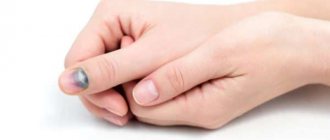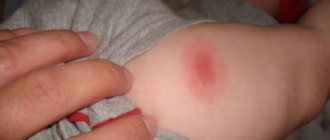Why might a child have an unpleasant odor from the ear?
A foul odor emanating from a baby's ears may be a symptom of a medical condition that requires medical attention, or a condition that can be easily treated. Experts identify several of the most common causes of odor, additional unpleasant sensations and a general deterioration in the child’s well-being. Parents need to try to determine exactly which area of the ear the smell is coming from: if it smells inside, then the stench is caused by internal factors, and if the stench comes from the skin, then perhaps it is influenced by external reasons.
Improper care
But most often a newborn smells behind the ears for only one reason: hygiene rules are not followed. A small child spends most of his time in a horizontal position, moves little and requires much more attention and care from an adult than at 3, 4 or 5 years old. His digestive system is not yet functioning as it should. Children under six months old often burp, and formula or breast milk flows into the skin folds between the head and torso, as well as behind the ears, sometimes getting into the ear canal.
The accumulation of food debris in the folds of a newborn’s delicate skin without proper and timely hygiene procedures quickly leads to redness, irritation and the formation of wounds in which infection can develop. This is what causes the unpleasant odor in the child’s ears.
Important! Do not forget to carry out hygiene procedures for preschool children several times a day. It is recommended to wash infants and wipe them with damp, clean wipes after each feeding, and also some time after it if the baby burps.
Inflammation of the middle ear
The special type of feeding of newborns, as well as their anatomical features, are predisposing factors in the development of inflammation of the middle ear. When feeding is done in a horizontal position, the risk of formula entering the Eustachian tube increases. This can lead to stagnation in the auditory tube, its infection and, as a result, the development of inflammation of the middle ear.
Ear odor in a child caused by otitis media is the most dangerous cause of the development of this symptom.
Catarrhal inflammation is not accompanied by the presence of odor from the ear, and there is no exudate in the external auditory canal with this course of otitis.
Purulent inflammation of the middle ear is characterized by the presence of fluid in the external auditory canal. In addition, a child may experience a characteristic unpleasant odor from the ear, the causes of which lie in the purulent nature of the exudate. You can suspect purulent otitis media by the presence of additional signs:
- The general condition of the patient is impaired. The child is irritated, rushes about in bed, turns his head, screams;
- The patient refuses to eat;
- There is an increase in body temperature.
Considering that the smell from the baby’s ear began to be observed several hours or days after the onset of catarrhal symptoms, the reason for the development of this symptom becomes obvious. It consists in the development of complications of ARVI, inflammation in the ear.
At the same time, additional symptoms come to the fore and, above all, pain in the ear. Since the child, due to his age, cannot express complaints, an objective sign of the presence of pain syndrome is increased pain when pressing on the tragus. As a result of such actions, the child screams. The presence of a combination of these signs is a reason to consult the child with an otolaryngologist in the near future. Suppuration is an absolute indication for the prescription of antibiotics, both in the form of ear drops and systemic action.
Otitis externa
The postauricular area and external auditory canal are very suitable places for the development of an infectious process. The addition of a bacterial or fungal pathogen contributes to the development of external otitis in children. In this case, in addition to some odor, swelling and redness of the lesion will attract attention. Peeling of the skin may occur. In addition, when touching the lesion, pain develops.
When otitis externa comes to the fore, a combination of various signs not related to lack of hygiene comes to the fore. In this case, consultation with an otolaryngologist is extremely necessary, since a fungal infection without proper treatment tends to spread.
Bacterial inflammation can be characterized by a significant impairment of the general condition.
Ear drops or ointments with an antibacterial and antifungal component can be offered as medications. The drug Candibiotic, which contains both components, can only be used in children over 5 years of age.
External factors
Unpleasant odor from a child’s ear can be caused by various factors.
In most cases, unpleasant odor from a child’s ear is due to reasons not directly related to the hearing organ. External factors of this phenomenon include:
- Failure to comply with hygiene rules. Pediatricians do not recommend overly thorough sanitation of the ear canals of newborn babies, especially using cotton swabs and other hard objects. Many young mothers, fearing damage to the baby's delicate eardrum, take this advice literally and do not pay due attention to cleaning the ears.
- Fluid getting into the ear. Water remaining in the ear canal after bathing does not itself usually cause a change in odor. The most common cause of the disorder is frequent regurgitation, which leads to the flow of a small amount of stomach contents into the ears. This is facilitated by prolonged exposure to a horizontal position, improper attachment to the breast, or the use of inappropriate artificial formula for feeding. In this case, a strong unpleasant sour odor appears from the child’s ear.
- Prickly heat. Newborns have an imperfect mechanism for thermoregulation and often sweat not only as a result of overheating, but also while eating or sleeping. Sweat accumulates in large and small folds of the skin, including behind the ears, leading to a sour odor.
- Allergic reaction. An unpleasant odor from a child's ear may appear as a result of the formation of weeping crusts that form as a result of skin rashes. Allergies are most often caused by an incorrectly selected formula, a violation of the diet of a nursing mother, the introduction of complementary foods, or the use of certain cosmetics and washing powders. If there is redness on the skin and itchy rashes around the ears, we can also talk about the development of dermatitis or diathesis.
Causes in children
Children may smell bad behind the ears due to inflammation of the middle ear, during the transition period, and during fungal diseases. In newborn babies, a foul odor behind the ears often occurs when they are often wearing hats and when the babies often lie on one side.
The cause of this unpleasant condition may be a fungal disease, as well as skin trauma. Chronic kidney and liver diseases can provoke the stench. A frequent cause of malaise is metabolic disorders and poor nutrition.
In some cases, the problem can be solved quite simply; the child only needs to wash behind the ears with water and baby soap twice a day and wipe dry. Newborn babies should not wear caps all the time.
It is worth paying attention to the structure of the ears. Children whose ears are pressed to their heads are more likely to develop an unpleasant odor behind the ears. These babies need to frequently wipe their ears with boiled water. Otherwise the peel may prohibit.
The main causes of unpleasant odor from the ears
Unpleasant odor from a baby's ears occurs due to improper hygiene, ENT diseases and foreign objects. The presence of a putrid odor, increased temperature and pain always indicate the presence of an inflammatory process. Reduced immunity plays a major role in the occurrence of ear diseases, which contributes to the rapid spread of infection.
Errors in caring for your baby
It is necessary to regularly clean the outer ear from dirt with cotton pads or turundas as it becomes dirty. However, it is prohibited to use cotton swabs to remove excess sulfur. It is easy for a baby to damage the eardrum, which will lead to hearing loss. In addition, cleansing with cotton swabs brings the opposite effect - wax gets even deeper inside the ear, forming a plug. Often such care leads to the development of otitis media. Don't clean your ear canal too often. Sulfur performs a protective function, it resists germs and viruses, and prevents dust, water and dirt from getting into the ear. If it is completely removed, then there will be no barrier to the penetration of pathogens.
Prevention
To prevent unpleasant odor from the ears in children, you should follow these recommendations:
- Bath your baby every day, especially in the warm season.
- Treat inflammatory diseases of the ears and ENT organs in a timely manner.
- If diaper rash occurs behind the ears, wipe the skin with Furacilin solution and lubricate with rich baby cream.
- If you are prone to allergies, exclude allergenic foods from your diet. Breastfeeding mothers should watch their diet.
Children's ears should be cleaned once a week using a cotton swab dipped in Vaseline oil.
An unpleasant smell from the ears of an adult or a child may indicate improper care of the hearing organs, allergies or infections. A doctor can determine the exact cause of the ailment after an examination .
Treatment
The selection of the treatment regimen and method depends on the individual characteristics of the child or adult, as well as on the cause of the unpleasant odor from the ear. If there is an allergic reaction, the specialist will select a local or general antihistamine and recommend changing the child’s diet to a more balanced one free from suspected allergens.
If the unpleasant odor is caused by poor hygiene, the specialist will explain how to avoid new problems and help you figure out how to solve the existing one. Also, in some cases, the use of immunostimulating agents and vitamin-mineral complexes may be required.
In the presence of inflammatory processes in the outer, middle or inner ear, complex therapy is required. Usually, the use of antiseptic, antihistamine and antibacterial drugs helps restore health and prevent the development of complications in this case. Sometimes, in addition to medications, certain procedures are required, for example, UHF, UV irradiation, blowing of the auditory tubes.
Important! No medicine should be used without consulting a doctor. Each remedy has its own characteristics and spectrum of action, contraindications and possible side effects.
Remember, any problems relating to the ears, both in adulthood and in childhood, cannot be ignored. Unpleasant odor is no exception. Moreover, it is worth remembering that diseases of the hearing aid tend to develop rapidly and cause serious complications without proper and timely treatment. Do not risk the health of yourself and your children, contact an ENT doctor at the first disturbing symptoms and strictly follow all the doctor’s instructions.
Solutions to the problem
Parents should closely monitor the condition of a baby up to one year old. Children are not able to describe what bothers them, but by some signs it can be determined that the cause lies precisely in discomfort in the ear area. With otitis media, the baby picks at his ears, often cries, and his hearing decreases.
In any case, if you notice an unpleasant odor coming from your baby’s ears, you should consult a doctor as soon as possible. Depending on the cause of the disease, the specialist prescribes:
- ear drops (Otinum, Sofradex) to treat inflammation;
- Akriderm ointment for fungal infections;
- local anesthetics for severe pain;
- For furunculosis, compresses with disinfectant ointments and antibacterial therapy are used.
At home, the ears can be wiped with infusion of string or Furacilin. If a foreign body gets into the ear, it must be removed as soon as possible. A pediatric otolaryngologist has the necessary tools to rid the baby of a foreign object without damaging the hearing organ.
Carrying out hygiene measures
Ears should be cleaned regularly
First of all, it is necessary to sanitize the outer part of the ears and the skin around the ears. To do this, use a cotton pad or swab moistened with boiled water. In case of severe contamination, visible to the naked eye, you can clean the ear canals using cotton wool. It is not allowed to insert them deeper than 0.5 cm. For children older than 3-4 months, it is allowed to use cotton swabs with a limiter.
Hygienic procedures should be carried out at least 2 times a week. After each bath, it is necessary to thoroughly dry the baby's ears to prevent possible water from flowing into the ear canal.
Prevention of allergies and regurgitation
To prevent unpleasant odor from the ears of a baby, the following recommendations must be followed:
- correctly attach the baby to the chest, making sure that his head is higher than his body;
- after breastfeeding or formula feeding, carry the baby in an upright position for at least 10 minutes to effectively remove gases from the stomach;
- select an artificial formula in accordance with the pediatrician’s recommendations and the individual characteristics of the baby;
- put the baby to sleep on a hard orthopedic mattress without a pillow;
- dress the baby according to the weather, avoid overheating;
- carefully introduce new foods into the diet of a nursing mother and child; if signs of intolerance appear (itchy skin rashes, intestinal upset), exclude the allergen from the menu;
- Use only hypoallergenic baby hygiene products, cosmetics and washing powders.
Common Causes
The cause of unpleasant odor from a child’s ear can be both infectious diseases and errors in care. When bathing a child, parents should not forget to rinse the area behind the ears, where sweat and sebaceous gland secretions accumulate. Parents of children whose ears are pressed tightly to their heads especially often encounter this phenomenon; in children with slightly protruding ears, this problem occurs less frequently.
Otitis
A fairly common cause of unpleasant odor from the ear in a child is otitis media. The inflammatory process occurs due to infection entering the ear canal. Otitis may occur in the following cases:
- if the child has a chronic source of infection in the body, especially if he suffers from pathologies of the nasopharynx;
- after swimming in open water, if dirty water gets into the ear canal;
- in case of hypothermia, due to reduced immunity;
- for fungal diseases of the ears;
- Otitis often becomes a complication of respiratory diseases and influenza.
With otitis in children, the temperature rises and the general condition of the patient is disturbed. The baby becomes lethargic, irritable, eats and sleeps poorly. Young children who cannot clearly explain what is bothering them often cry and press their palm to their sore ear.
Diagnosing otitis media is not difficult. An otolaryngologist simply needs to examine the patient’s hearing organs to notice pathological changes in the ear.
If suppuration is observed during otitis, then systemic and local antibacterial drugs must be prescribed.
Allergy
A child's ear may smell due to allergies. Most often, this phenomenon is observed in infants whose mother eats allergenic foods. When allergens enter the child’s body, rashes appear on the skin, the delicate skin bursts and begins to get wet. When infection gets into the wounds, a purulent process begins, which is accompanied by an unpleasant odor.
Allergies may have accompanying symptoms - sneezing, coughing, lacrimation and rhinitis. To get rid of an unpleasant odor, it is necessary to identify and eliminate any contact with allergens.
Improper care
Infants who are often in a horizontal position develop prickly heat behind the ears. In this case, the delicate skin rots and peels off, forming weeping wounds that emit an unpleasant odor.
In addition, infants often burp, and the sour mass flows down the cheek and gets behind the ear. If parents do not wash their baby in a timely manner, the milk becomes very sour and gives off a foul odor.
Some children produce too much earwax. If your baby's ears are not cleaned regularly, this can also lead to a foul odor. Do not forget that you need to clean your ears using cotton wool; if the ears are too dirty, then the cotton wool is pre-moistened with Vaseline oil.
To prevent prickly heat behind the ears, you need to bathe your child every day, especially in the summer. If for some reason bathing is postponed until the next day, then the baby needs to be thoroughly washed and his face washed, washing all the folds.
Infants should be fed at an angle, in which case the risk of regurgitation will be minimal. After eating, the baby is carried horizontally for several minutes, placing the baby's head on your shoulder. This also helps minimize the risk of regurgitation.
A pediatrician or visiting nurse will tell you how to properly care for an infant.
Foreign body
Children over one and a half years old already play well and spend a lot of time with their favorite toys. Children of this age often experience foreign objects getting into the ear canals and nose. If a child puts a small part from a toy or a bead into the ear, then this does not immediately manifest itself, but if such a part was in the ear for too long, then the skin is injured and an inflammatory process develops.
A foreign object entering the ear is often accompanied by pain and itching; after a few days, ichor or pus may begin to flow from the ear. This is accompanied by a foul odor.
A doctor must remove a foreign body from the ear using special medical instruments. You should not try to remove a bead or other small part from your ear on your own. This can damage the eardrum and cause bleeding.
If a live insect gets into the ear, then oil is first instilled into the ear canal, and then the bug or fly is removed with tweezers.
What parents can do
Of course, it is very difficult to find out on your own without the help of a specialist why a child’s ear stinks or has an uncharacteristic odor. There may be several reasons for the appearance of this symptom, and the exact one can only be determined through a thorough examination and examination of the baby by an ENT specialist. But still, parents can, in the absence of ear pain and other disturbing symptoms, in addition to the smell, take some actions without risk to the baby:
- Examine the auricle and identify places where the delicate skin has become wet or reddened due to sweating or food debris getting on it during regurgitation. These areas should be treated with a special ointment prescribed by the pediatrician. Some people use folk recipes to restore a child’s skin, for example, they use chamomile, thyme, and bay leaf rubs.
- If you suspect the presence of a foreign body in the child’s ear canal, you should immediately consult a doctor. The same should be done if it is assumed that the child has started an inflammatory process.
- If your baby has allergic reactions, it is also better to show it to a doctor. Usually, to restore the child’s health in this case, as well as to prevent the development of complications, local and general medications are prescribed to relieve allergy symptoms. It is also important to normalize the nutrition of the baby and his mother if the baby is breastfed.
- In case of allergies and heat rash, be sure to clean the problem area of contaminants and make sure that the air calmly penetrates to the right place.
Important! To reduce the risk of food debris and breast milk getting into the ear and behind-the-ear space when regurgitating, it is recommended to feed the baby not lying down, but at an angle. At the same time, his head should be raised, and after feeding the baby it is better to carry him in a column. It is also advisable to put a child under one year of age to sleep only on his side, and not on his back.
Traditional methods of treatment
Traditional methods of treatment will also help get rid of the unpleasant odor behind the ears.
- Tea tree oil is a good antibacterial agent. It is recommended to lubricate the skin behind the ears of adults and children 3 times a day with tea tree oil. It can first be diluted 1:1 with olive or linseed oil.
- The skin behind the ears is wiped with a concentrated decoction of sage or chamomile. Herbs are brewed at the rate of a tablespoon per glass of water.
- If the cause of the unpleasant odor is a piercing, then wipe the ears with an alcohol tincture of calendula several times a day. At the same time, the earrings are scrolled and the temples are wiped. In some cases, jewelry is temporarily removed.
- Apple cider vinegar will help eliminate itching and unpleasant odor. A cotton swab is moistened in it and the skin around the auricle is wiped. When treating children, vinegar is diluted in half with water.
- Celandine juice helps with fungus in the ear canals. It is pre-mixed with boiled water and dripped into the ears 2 times a day, 2-3 drops. The duration of treatment is a week.
- Onion juice will help eliminate the stench behind the ears. This product has a pronounced antibacterial effect. Soak cotton wool in the juice and wipe the area behind the ears. It is worth considering that onions give off a very specific smell, so 20 minutes after applying the juice, wipe the skin with a cotton swab dipped in soapy water.
- Wipe the skin around the ears with alcohol tincture of propolis. This remedy has a pronounced anti-inflammatory and antifungal effect.
- Brew bay leaf and bird cherry leaves. Take a tablespoon of plant material per glass of water. The resulting decoction is used to wipe the auricle and the area around it three times a day.
In addition, it is recommended to treat the ear canal and pinna with hydrogen peroxide twice a day. If there is fungal plaque in the ear canal, then it is completely cleaned by regularly changing cotton swabs.
It is recommended to combine or alternate traditional recipes, in which case the effectiveness of treatment will be higher.
Diagnostics
If an unpleasant odor is detected from the ear, the otolaryngologist carefully examines the child or adult, and then presses on the cartilage in front of the auricle. Also, to make an accurate diagnosis and select the appropriate treatment, procedures and studies may be required, such as:
- otoscopy;
- examination of the ear using a tuning fork;
- tympanometry and audiometry;
- otoneurological testing;
- taking a blood test to detect the presence of infection;
- microscopy and bacterial culture of discharge from the ear canal of the diseased ear;
- immunological study.
In some cases, it is necessary to undergo other tests. For example, if the presence of tumors and various traumatic injuries is suspected, an MRI or CT scan is required. And sometimes the results of an ear ultrasound are needed to make an accurate diagnosis.

